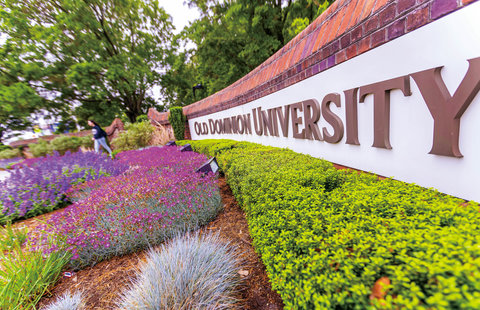An undergraduate Minor degree in Environmental Engineering can be obtained by Civil Engineering major students or students from outside the Civil and Environmental Engineering department. Various Environmental Engineering courses are available in Environmental Engineering minor program that allow pursuit of several areas of study or specialization within Environmental Engineering -- water quality, water and wastewater treatment, hazardous wastes, air quality, sustainable development, and energy engineering.
Program Highlights
-
Civil & Environmental Engineering are highly interconnected in terms of analysis, design, implementation, and management activities, which is why the combined Civil Engineering major + Environmental Engineering minor degree is the most highly sought-after qualification by employers.
-
With additional graduate level Environmental Engineering coursework, one can pursue a career as an Environmental Engineer.
Careers
Check out these ideas from ODU's Center for Career & Leadership Development and the Occupational Information Network (O*NET). A median salary is a midpoint of what people typically earn—half of those surveyed earned above the median salary, and half earned below.
Requirements
Transfer
At ODU, we understand that as a transfer student you have unique needs that require a wide array of campus resources. The Center for Advising Administration and Academic Partnerships aims to create a transfer inclusive culture that supports the successful...
Featured Courses
Introduction to the fundamental principles of environmental engineering. Topics in water quality, water and wastewater treatment, air quality, and solid waste and landfills are discussed. Prerequisites: CHEM 121N-CHEM 122N, MATH 211, PHYS 231N and junior standing in CEE.
Discussion of water quality constituents and introduction to the design and operation of water and wastewater treatment facilities. Prerequisites: CEE 330, CEE 350.
Course covers the overview of renewable energy sources; fundamentals of biofuels; biomass and types of biomass (e.g., woody biomass, forest residues, agricultural residues, energy crops); composition of lignocelluloses (cellulose, hemicellulose, and lignin); biomass conversion technologies; thermochemical, supercritical water, and biochemical conversion processes; types of biofuels from biomass; liquid fuels (bioethanol, bio-oil, biocrude, and hydrocarbons); gaseous fuels (synthesis gas, hydrogen, biodiesel); solid fuels (biochar, torrefied biomass); biodiesel from vegetable oils, algae to biofuels; value-added processing of biofuel residues; economic and environmental assessments; policies and future R&D. Prerequisite: permission of the instructor.
Cost
Estimated rates for the 2024-25 academic year. Rates are subject to change. Other fees are assessed for special services and certain academic programs. Anyone that is not a current Virginia resident will be charged non-resident rates. That includes international students.
Ways to Save
Here are a few ways for you to save on the cost of attending ODU. For more information visit University Student Financial Aid.
Contact







